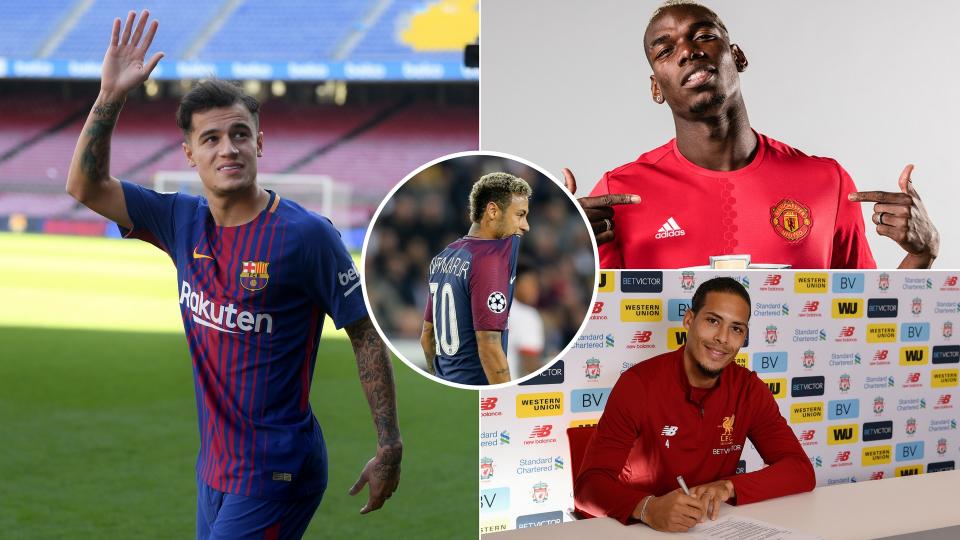Financial Fair Play 2.0: What are the new proposals and is it too late to stop the transfer explosion?

Neymar for £200m, Virgil van Dijk for £75m. Financial Fair Play doesn’t seem to be working in its current form and that’s why UEFA are set to vote on new plans to overhaul the system.
Managers have complained that clubs like Manchester City and Paris Saint-Germain are being subsidised by entire countries and making it impossible to compete on a level playing field in the transfer market.
“For me, it is the consequence of the ownerships that have completely changed the whole landscape of football in the last 15 years,” Arsenal manager Arsene Wenger said of the Neymar deal. “Once a country owns a club, everything is possible.
“It becomes very difficult to respect financial fair play because there are different ways for a country to have such a big player to represent a country.”
Such deals could be a thing of the past if the new restrictions are imposed following a vote on the restructure at UEFA’s Executive Committee on May 24.
In the new format, PSG’s €420m splurge on Neymar and several other stars would have to be offset by €320m in player sales as UEFA want to set a limit of €100m difference between expenses and income for clubs per year.
READ MORE: Beckham’s Miami dream one step closer
READ MORE: Gossip – Chelsea ‘in for Ronaldo’
Paul Pogba’s move to Manchester United would have been similarly problematic.
The Frenchman would have taken the Red Devils within a whisker of their allotted budget and prohibited them from signing other key targets.
Henrikh Mkhitarayan and Eric Bailly also arrived that summer for a combined total of in excess of £70m, along with a free swoop for Zlatan Ibrahimovic, taking the spend to more than £160m.
Mourinho has complained that his transfer spend is still not enough to bridge the gap in the quality of his squad with that of the Abu Dhabi-backed Manchester City. Under the new system, the Portuguese would find it even harder to catch up.
“We are in the second year of trying to rebuild a football team that is not one of the best teams in the world,” Mourinho said. “Manchester City buy full-backs for the price of strikers. When you speak about big football clubs, you are speaking about the history of the club.”
“It [the money Manchester United have spent] is not enough. The price for the big clubs is different than for the other clubs. The big historical clubs, they are normally punished in the market because of their history.”
In many ways, Financial Fair Play 2.0 has arrived too late. The transfer boom has already happened. We are experiencing hyperinflation in the market and even defenders are being signed for eye-watering sums.
Manchester City have acted intelligently to prepare for what could be a truly transformative moment in the history of football. Pep Guardiola has lowered the age of his squad and tied down players onto long-term contracts now.
United are in a far less healthy position. Mourinho, as he has done throughout his career, is building a side with a short-term vision. Alexis Sanchez is an outstanding player but he will need to be replaced after four or five years – at a huge cost.

If Financial Fair Play 2.0 is rubber stamped in May, that huge outlay suddenly becomes a major obstacle. We will start to see clubs stripping their own assets to accommodate new players.
READ MORE: Conte happy for Batshuayi to stay
READ MORE: Mkhitaryan set for Arsenal debut
In fact, the new proposals may even dictate fire sales at clubs across Europe in any case. UEFA reportedly hope to limit squads to 25 professional footballers in an attempt to prevent the stock piling of players.
Chelsea, in particular, would be affected by this move. The Blues have become notorious for recruiting youngsters and farming them out on loan across the globe. Very few ever even see the inside of the Stamford Bridge dressing room on a matchday.
In theory, much like the original Financial Fair Play, the ideas proposed by UEFA make a degree of sense. In reality, the new proposals are unrealistic and will be met with a hot reception by Europe’s football elite.
The horse has bolted. The genie is out of the bottle. However you want to describe it, the financial power very much rests in the hands of the few and it will prove almost impossible to wrestle back from their clutches at this stage.


